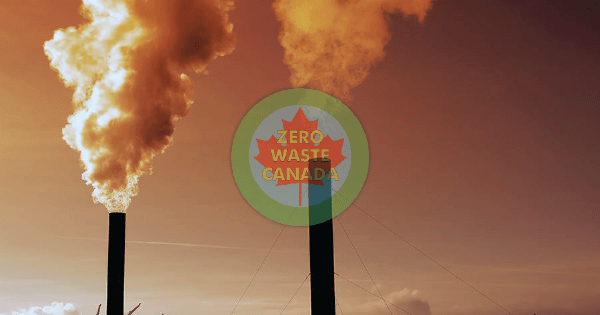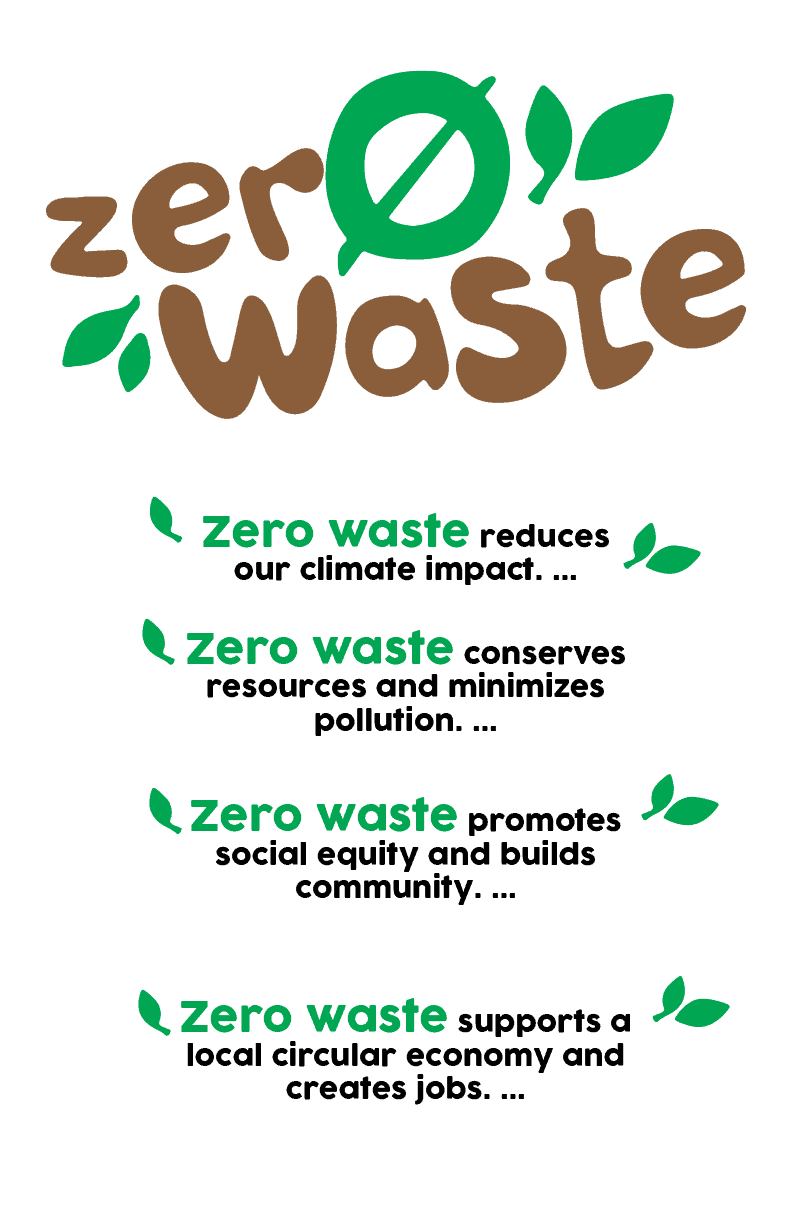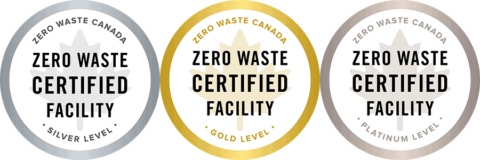More and more people today are drawn to the idea of living a zero waste lifestyle.
This is not surprising, because it's becoming more and more clear that the trash that we produce is having a negative effect on the earth. Our trash takes up lots of space and causes vast negative environmental impact, and it isn't simply going away.
A 2013 study found that Canadians produce more waste than the citizens and residents of any other country in the world.
In fact, the study discovered that the average Canadian produced 777 kilograms of garbage each year. This number was far above the world average of 578 kilograms. As a nation, Canada generates almost thirty-one million tonnes of waste each year. Recycling in Canada hovers around 30%.
Zero Waste Canada aims to change all of that. This grassroots organization is working hard to turn this problem around and is encouraging the people of Canada to reduce the amount of waste they create. In a best-case scenario, they hope to help people to work towards creating no waste at all.
To learn more about this organization, their work, and living a zero waste lifestyle in general, read on. After reading this post, you'll be inspired to reduce your waste production as well.
Who Is Zero Waste Canada?
Zero Waste Canada is a non-profit organization with the explicit goal of spreading zero waste policies and practices to all people, communities, businesses, and groups throughout Canada. This organization is a part of the larger Zero Waste International Alliance (ZWIA) which works to spread this message around the entire world.
The organization and alliance's goals are simple. Both wish to research the positive benefits of reducing waste and to share their findings with the world through various promotions and they aim to train individuals and groups to implement zero waste practices. They also develop ways to evaluate whether or not their message is being heard.
Benefits of Zero Waste Living
There are so many benefits to reducing the amount of waste we produce, and Zero Waste Canada hopes to impart these benefits to everyone, everywhere. Their slogan, "Because there is no planet B," speaks to the fact that there is only one earth, and if we pollute it heavily, we have nowhere else to go.
Pollution is difficult to clean up; it's much easier to just avoid polluting in the first place.
So, the biggest benefit of encouraging a zero waste lifestyle is so that we will have somewhere to live well into the future. Zero waste living reduces our climate impact, conserves resources, minimizes pollution, supports the economy, and promotes social equity and community.
When you look at it that way, reducing the amount of waste we produce is crucial.
Is a Zero Waste Society Achievable?
Many people wonder if a zero waste society is even possible; based on the way that we live now, it seems difficult to imagine.
However, many scientists, researchers, and Zero Waste Canada believe that it is. To reach this lofty goal, we will all need to do our part to consume less and to recycle and reuse more. We all need to be conscious of the waste that we produce in our daily lives, and we need to consciously work to reduce it.
A zero waste society won't happen overnight, but it's something we can and should work together to achieve.
What Has Zero Waste Canada Accomplished?
Since its inception, Zero Waste Canada has accomplished much.
First, the organization has worked with all levels of the Canadian government to encourage better policies regarding the production of and disposal of waste. They've pushed for better legislation and initiatives to reduce waste and to support the reuse of resources.
Further, the group has created several programs to directly encourage the reduction of waste as well.
Zero Waste Facility Certification
First, Zero Waste Canada offers a Zero Waste Facility Certification for brick and mortar organizations and businesses of all kinds. Any facility may apply for this certification; they must prove that they create zero waste to receive it.
Businesses and organizations choose to pursue this certification for a number of reasons including to demonstrate leadership in their industry, to attract talent, to align with their mission, to promote brand culture, and to network with other, like-minded businesses.
Zero Waste Event Certification
Further, Zero Waste Canada is creating a similar program for large-scale events like conferences, trade shows, and music festivals. These events all tend to produce massive amounts of trash and many of the food and beverage items sold or distributed at them are single-use by nature.
A zero waste event certification would encourage events such as these to figure out ways to produce no waste at all. Once some events manage to achieve this, it's likely that others will want to follow suit.
Zero Waste Education and Training
Zero Waste Canada also offers a number of Zero Waste educational programs that are designed to help businesses and individuals move towards reducing the waste that they create. These courses are offered for free and are accessible online to anyone who wishes to take them.
What Types of Projects Are They Working On?
Zero Waste Canada continues to work on all of the above projects and hopes to spread its message far and wide over the next few decades. It hopes that Canada will soon drop out of its first-place spot for being the country that produces the most waste, and they hope to encourage more and more Canadians to reduce the amount of waste that they produce.
The group also continues to work with the Canadian government to encourage policies and regulations that will further reduce the nation's waste production.
Which Countries Best Manage Waste?
Every country is different. Even countries that border one another may have vastly different languages and cultures. Because of this, it's no surprise that the amount of waste that each country produces varies as well. Some countries create very little waste when compared to the countries that produce the most.
Which Countries Create the Most Waste?
You already know that Canadians produce more waste than any other country per capita, but it might surprise you that the European country of Bulgaria is in second place. The United States is third, and Estonia and Finland follow it to complete the top five.
Which Countries Produce the Least Waste?
On the other side of things, the countries that produce the least waste are interesting as well. They are all on the smaller side, so that may help.
The country that produces the least waste in the world is the tiny country of Andorra in Europe; the nation's population is only 70,500. Andorra is followed by island nation St Vincent and the Grenadines, Monaco, Belize, and French Guiana.
How Can I Get Involved With Zero Waste Canada?
Zero Waste Canada is always looking for more people to get involved with the organization to help spread the word about going green and living a zero waste lifestyle.
There are two primary ways to get involved. First, you can become a member. Zero Waste Canada offers memberships for individuals, businesses, non-profits, and governmental entities. Your membership fee will help the organization develop programs and you'll have access to their educational materials, job board, and events.
Second, you can work as a volunteer. You can add yourself to the volunteer list on Zero Waste Canada's website, and they'll reach out as opportunities arise.
Whether you're a member or volunteer or just an interested fan of the movement, you can also contact them with any information you have about any business that produces little to no waste. They'd love to hear about these businesses and add them to their list.
Is Going Zero Waste Expensive?
Going zero waste does not have to be expensive. In fact, after a short time, you'll find that it actually saves you money.
If you're someone who lives on a budget, you can save money and produce less waste by buying fewer things.
Repair and reuse things that are broken instead of buying something new. Shop at thrift stores instead of at stores that sell items brand new. Keep jars and other containers to use for storage instead of buying brand new containers to store things.
And, of course, recycle everything that you can.
More and more zero waste shops are popping up around Canada and they can be a big help to you, too. They are not expensive and you'll find things that are affordable for every budget.
Many of these stores sell secondhand items that are still in excellent shape. Others sell food products in bulk form; you bring your own containers so you won't have any used plastic bags leftover.
What Small Steps Can Everyone Take To Help Their Mission?
In order to achieve the goals of Zero Waste Canada, we all have to do our part. Each and every one of us can live a low waste lifestyle with a little effort.
If you're looking for great tips on living a low waste life, check out the many informative low waste educational resources that are available on Zero Waste Canada's website, and also take some time to check out the organization's blog. There, you'll find tips for moving towards a zero waste lifestyle, how to buy food with zero waste, and how to make your home waste-free.



